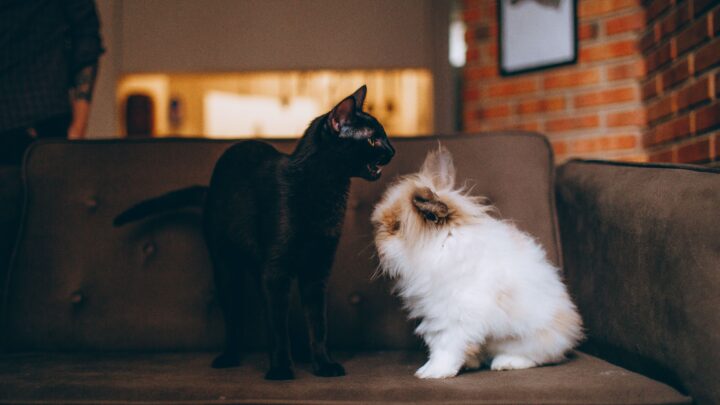“Do cats attack rabbits?” you whisper under your breath. “How come nobody ever warned me that this was a possibility? Who thought chasing after a random mouse here and there or munching on the creepy crawlies from nightmares (umm, spiders?) was the same as attacking a rabbit!?”
You’re completely aware that you’re freaking out over something humans have known forever. You just can’t help but wonder what’s wrong with humans while you’re watching over what you thought was your precious purrincess. “Look at her meow and purr like nothing happened a couple of moments ago!”
What exactly did happen, though? Did your ferocious feline attack your neighbor’s pet rabbit while you were busy watching reruns of Friends? (Come on, we already know who ends up with who!) Or did she run off to the nearest forest and ambush an unassuming animal?
Perhaps she caught a glimpse of a rabbit on your front porch, stormed outside before you could even utter “Don’t touch the beautiful bunny!” and showcased her hunting prowess? Whichever way she decided to release the beast that’s been hiding underneath the fluff, she’s left you wondering.
“Do cats attack rabbits? And what do you do when you notice your cat’s planning on gnawing on rabbit bones for dinner?” We don’t want to freak you out, but cats (domesticated or otherwise) attack rabbits. As a matter of fact, dead rabbits aren’t the only gifts cats love to bring to their humans.
At the end of the day, your little purrincess might not be as precious as you want her to be. And you better believe she wouldn’t miss the opportunity to take down Buggs Bunny for good. No more Looney Tunes, but we’ve gathered a smattering of answers you might want to hear.
Do cats attack rabbits because they want to eat them?
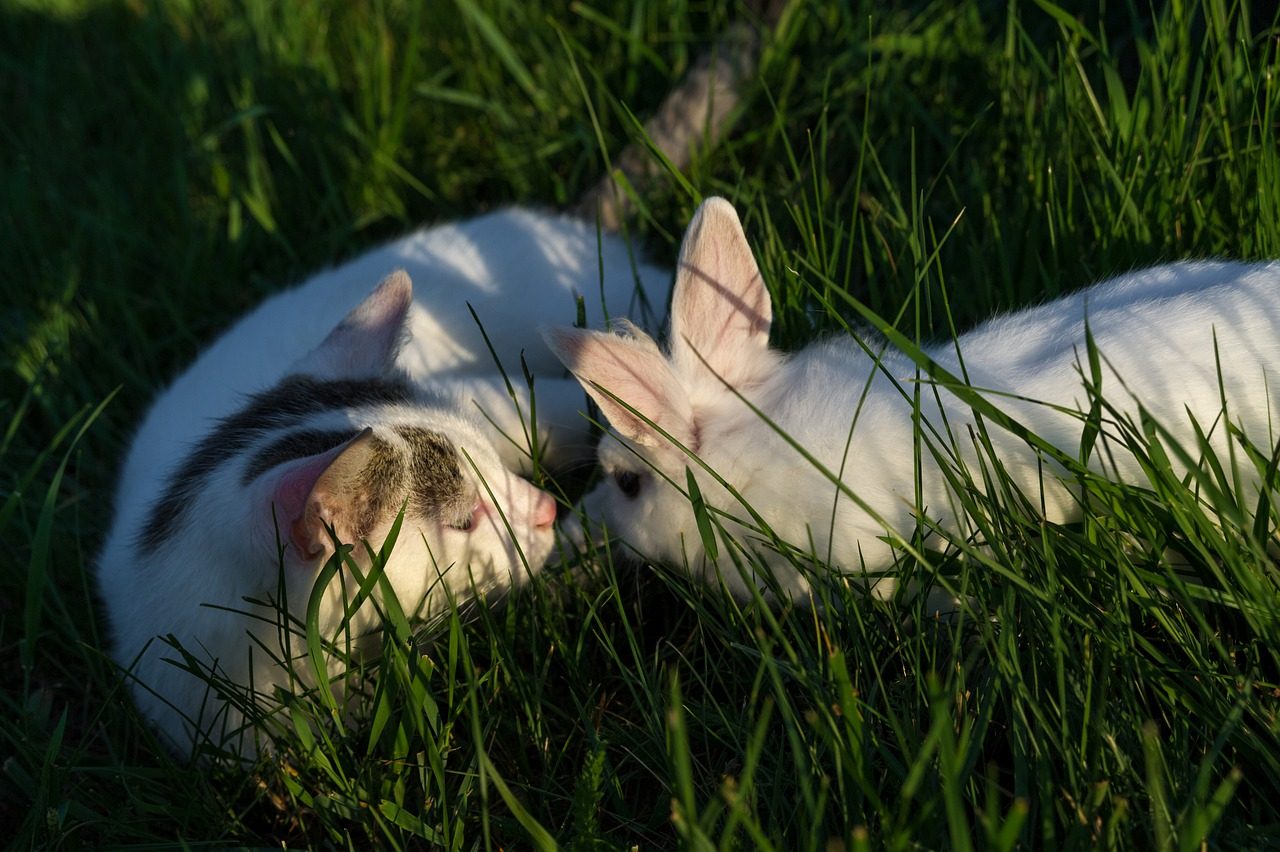
Cats are a little more complicated than that. That’s why a simple yes or no answer wouldn’t do the trick. Trust me, you don’t want your furchild hanging out with your neighbor’s pet rabbit before you make sure you understand one thing: Why cats are the way they are.
Cats are obligate carnivores. For those who don’t know what that means, cats need a bunch of meat, animal protein, and animal nutrients to survive and thrive. They don’t need fruits, veggies, and whole grains the same way you do because they aren’t omnivores.
They don’t even possess the digestive enzymes necessary to break down and process most foods you eat on a regular basis (because they aren’t omnivorous, of course). Maybe you want to surprise your fluffy friend with a bowl of milk or a Puppuccino. Surprise, surprise – you shouldn’t do that because she can’t have lactose.
Or you may want to share a bite of your sundae with your favorite fluffball because she’s been feeling down. Another shocker – she can’t taste sweet things. Not to mention that overconsuming sugar can cause a heap of digestive problems ending with a bang… hopefully inside the litterbox!
Circling back to the question from the beginning, do cats attack rabbits because they want to munch on them? Cats are carnivores and rabbits are what carnivores seem to thrive on, right? That means that you wouldn’t be far off assuming that your furry friend undergoes her morning antics because she’s hungry, right?
That’s certainly pawsible, but you shouldn’t stop there. Didn’t your mischievous monster chase after your neighbor’s rabbit moments after she scoffed down an entire bowl of Meow Mix!? What’s the deal, then?
…or because they’re cunning hunters and can’t help but surrender to their predatory instincts?
“My furball? A hunter? Nooo, she only hunts bugs and butterflies because she likes to chase after them, but she’s wouldn’t hurt a fly!” We don’t necessarily think of our meowers when someone talks about hunters and predators. But perhaps we should.
And perhaps we should do our research because domestic cats have a 32% success rate when it comes to hunting, killing, and eating other animals. As a matter of fact, their success rate is higher than that of other wild animals such as lions, wolves, and tigers.
Now, we’re not saying that Ms. McFluffer is a cold-blooded killer (at least not deliberately). But, thanks to her DNA, she might not be able to resist the urge to pursue what she deems to be her prey.
And, we’re not saying that cats haven’t been domesticated for a long, long time. They don’t need to hunt for food; they have their food served on a silver platter. But, that’s not to say that cats don’t feel the need to hunt.
In fact, hunting is still an instinctual behavior of our four-legged friends. Critters and crawling creatures galore don’t hit that “That was the purrfect catch!” spot, and that’s why cats resort to hunting bigger, better prey – such as rabbits.
If you’re one of the “lucky” ones, your feline friend might even grace you with a dead rabbit’s paw or some other part of the body she didn’t manage to munch on.
Kidding aside, you might want to keep your neighbor’s rabbit away from your cat when she starts her pre-pounce-butt-shake. We can’t stress this enough – cats don’t only attack rabbits because they’re hungry; they also attack for fun!
Then why do cats attack rabbits?
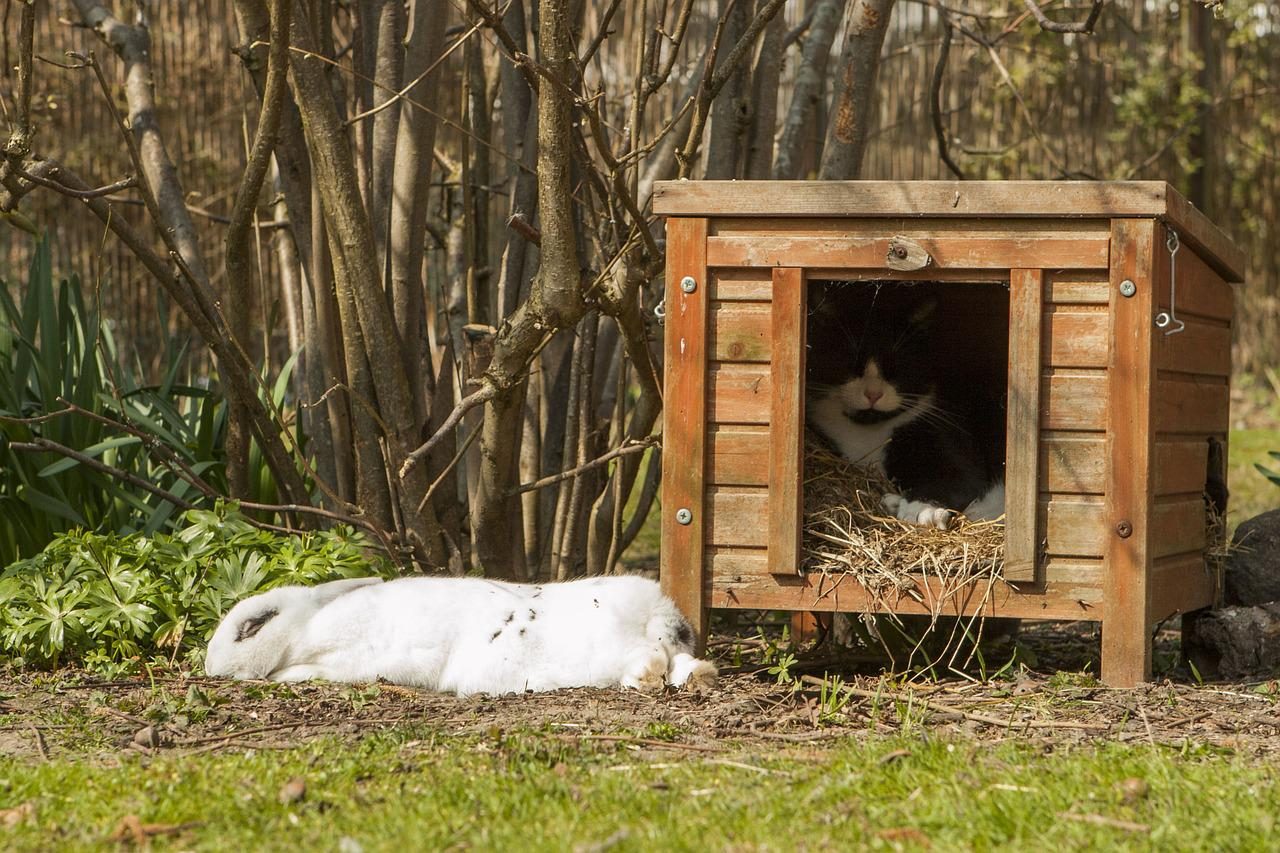
“Why on earth do cats attack rabbits when they’re provided with as much Meow Mix as they can munch on, critters and crawling creatures galore, and a plethora of chew toys!?”
Cats are weird. Cats display so many odd behaviors nobody seems to understand – the “elevator butt” thing, sneering, winking, knocking things down, kneading, head-butting, chattering, and chirping. And, let’s face it, rabbit hunting deserves a spot on the list because it’s pretty weird.
What’s the reason your feline friend gives chase to a butterfly even after she scoffs down a generous portion of premium cat food? Why does she munch on a mouse even after she snatches a chunk of rotisserie chicken from the table? And why on earth would she nibble on spiders even after she gets a tummyache?
We can’t provide you with one reason because there are many! For starters, cats are carnivores, so they adore munchin’ and crunchin’ on a bit of protein. And rabbit meat is a great source of protein and a great way to get their daily dose of vitamins, minerals, and fatty acids.
On the other hand, cats are hunters, which means they love the thrill of the chase. Not only are they absolutely amused with the whole “playing with your food” concept. They don’t shy away from hunting even when they aren’t planning on throwing a feast – for themselves and you.
Oh, and hunting’s pretty much a part of a cat’s DNA. Cats (wild and not-so-wild) have been hunting their little butts off since the beginning of time and they’ve managed to hold onto some of those predatory instincts even after being domesticated. How crazy is that!
What happens when the rabbit bites back?
What have we learned so far? Cats attack rabbits for a bunch of reasons. Regardless of any of them, we should make sure to keep our Buggs Bunnies safe, sound, and away from unwanted paws, claws, and fangs.
Surviving a cat’s bite doesn’t sound that bad. But, when you’re a little rabbit, you might have a hard time recovering. Ain actual fact, a cat’s teeth can easily cut through a rabbit’s bones, leading to lethal consequences. Plus, cat saliva contains bacteria that can lead to infections, sepsis, and death.
But, what happens when the rabbit bites back (sort of)? A poor, little bunny isn’t likely to chomp his way out of an attack. However, that’s not to say that he doesn’t have a way of dealing with such a sticky situation. Believe it or not, a rabbit’s way of dealing with a cat attack seems to be a condition known as tularemia.
“What? Tularemia? Who thought I should be worried about my cat and not my neighbor’s rabbit!?” Actually, you should only be worried when you’re 100% sure your neighbor’s rabbit is infected with the bacteria responsible for causing tularemia.
Tularemia (also known as rabbit fever) is a bacterial disease common among rodents and rabbits. But cats can get tularemia after eating the meat of the animal that’s infected, drinking water that’s contaminated, or getting bitten by insects carrying the same bacteria.
While not that common among cats, tularemia is certainly not something you want your cat to contract. With symptoms such as high fever, swollen lymph nodes, abdominal discomfort, and organ failure, tularemia can be fatal. Contact your vet the moment that you notice any of the symptoms!
What to do when your cat attacks a rabbit
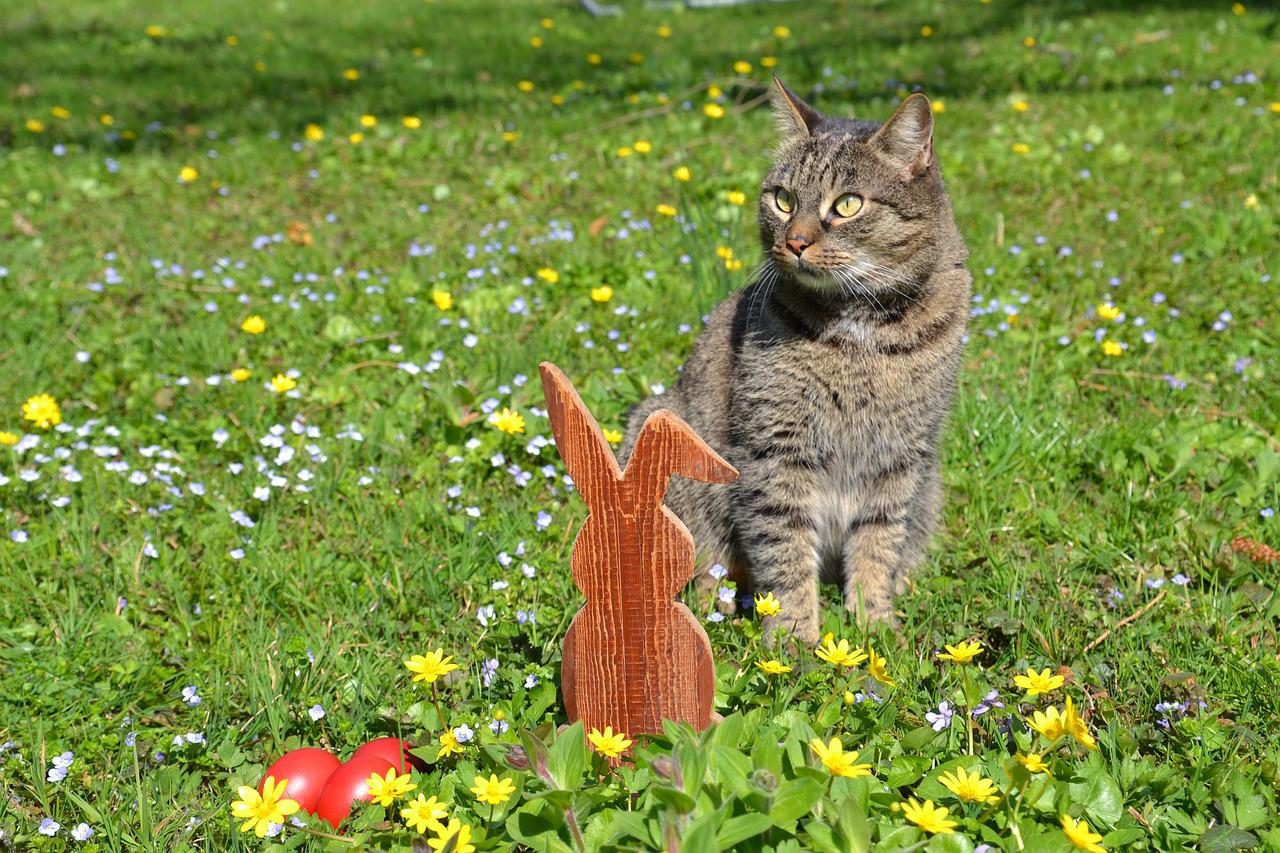
“Do cats attack rabbits? And, what should you do if your cat attacks a rabbit? Should I separate them or should I let them deal with their aggression the only way they know how – by biting each other’s necks off?”
Here’s the thing. You’re better off preventing the attack from happening than dealing with them once they start tearing each other’s fluff off.
Feel free to look further down the article to check our advice on how to keep your cat from attacking a rabbit. But, here’s what you do when the damage has already been done.
Starting with the obvious solution, cry out loud (not literally) for your cat to stop doing what she’s doing and come back. Additionally, try to distract her with things she’s familiar with or obsessed with – her favorite toys, cat treats, or even something that only makes sense for the two of you (a cardboard box for my cat!)
Whatever you do, don’t try to separate them with your hands! Cats can become pretty aggressive when they’re worked up like that. Their instincts are running wild and they might turn their back on you and attack you the same way they’re attacking the rabbit. Separate them gently once they stop going at each other’s throats.
And don’t be too scared to consult with a vet or animal behaviorist! You might have noticed your fluffy friend being aggressive towards animals – rabbits, raccoons, even other cats. Maybe you noticed she’s been aggressive towards you. Whatever the case might be, talking to a professional can do wonders.
How to keep your cat from attacking rabbits?
Now that we’ve answered whether or not cats attack rabbits, you might be pondering whether you can keep your cat from attacking them.
Maybe you’ve been planning on getting another fluff for your already overly-comfortable fluffy friend. Or you’ve been trying to keep your fluffy friend’s killing sprees to a minimum.
Whichever the reason, you might be pleased to learn that you’re not barking (or should we say meowing) up the wrong tree. We’re pretty sure that you’re able to keep your cat from attacking rabbits with a couple of tips, tricks, and tweaks. And, here’s what we’ve gathered.
First things first, one of the biggest culprits for your cat’s obsession with hunting rabbir seems to be her predatory aptitude. But, you can divert that aptitude. Keep her busy at all times, engage her hunting desires with the help of toys, and provide her with plenty of physical activities.
On the other hand, you can’t go wrong with taking away the one thing that makes her such a good hunter. Cats move with ease (Gigi Hadid, who!?) and they try not to make a sound while they’re stalking the prey. But, when you put a little bell on your cat’s collar you’re warning the prey that she’s on her way.
And, we can’t forget that your cat’s better off NOT being hungry while she’s chasing after the rabbit. Provide her with enough carefully crafted cat foods and cat treats (and an occasional bite of chicken) to make sure she doesn’t hunt out of hunger.
Whether you’re trying to protect your (or your neighbor’s) rabbit or looking to diminish your cat’s hunting escapades, you’re better off keeping her away from the thing she wants to hunt.
How to keep cats and rabbits as pets together
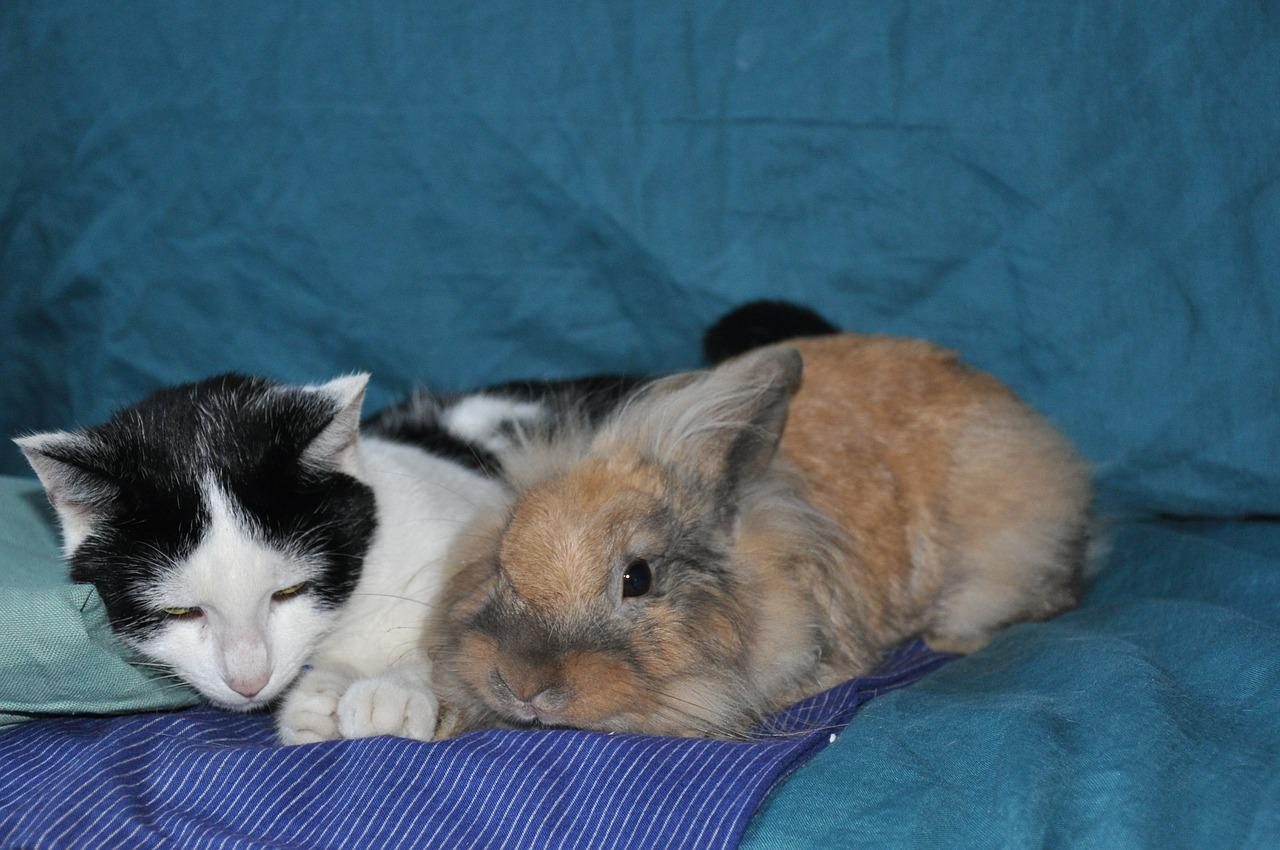
Maybe we can avoid the whole “Do cats attack rabbits?” thing and focus on whether we can keep the two as pets, together? We can’t think of a better duo with their fluffy fur, adorable paws, and addicting purrsonalities. And, we can’t wait to give you the scoop on how to keep them from killing each other!?
Starting with a bang, cats can and will attack rabbits when they get the opportunity. Make sure you give them enough time and space to sniff each other’s butts and get to know each other while you’re keeping a close eye on them.
And, when possible, make sure they’re both young – that way they grow up thinking they’re friends.
On the other hand, don’t shy away from getting them separate beds, separate rooms, and even separate houses! That may sound like overdoing it, but cats are very, very territorial (hence the million ways of marking their territory) and they need some time on their own every now and then.
Rabbits are right there with them, so make sure they have their own space. Not only that, make sure to separate them during feeding times of the day. You don’t want them to gouge each other’s eyes out, right? Keep a watchful eye on them always, but especially while you’re feeding them!
Oh, and don’t forget to transfer your cat’s scent onto your rabbit (and the other way around!) “Wait, what!?” Both animals (but especially cats) mark their territory by leaving their scent everywhere around them – around the apartment, on your clothes, on the porch, even around your backyard.
And, by rubbing their scents onto each other you’re making sure they know each other (without actually getting to know each other). Combine these things and voilà – you have yourself two pets!
Conclusion
Cats DO attack rabbits – and we couldn’t be more gutted about that! Our fluffy friends love doing everything they can to drive us completely crazy, and that includes hunting rabbits and other furry friends, too.
But rabbits can be pretty bad for cats, especially when consuming them. Cats can get very, very sick from consuming rabbit meat or saliva.
So, you’re better off keeping your fluffy friend away from rabbits or following the advice we’ve given for successfully keeping the two of them together as pets. Good luck!

